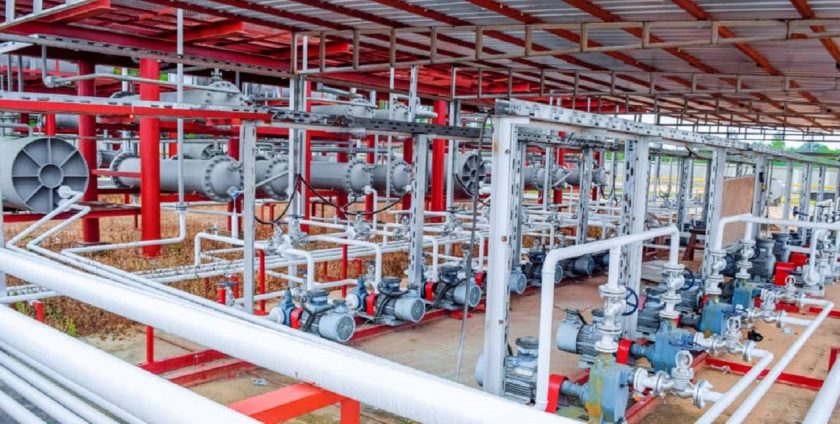
- Momoh Oyarekhua, Chairman of CORAN, states that supporting modular refineries will grant Nigerians access to cheaper fuel, eliminating various costs such as importing refined products and clearing fees.
- According to Oyarekhua, four modular refineries are functional in Nigeria, producing various petroleum products except fuel (PMS) due to the high cost of obtaining the required reformer.
- Oyarekhua highlighted that those modular refineries, located near wellheads in states such as Delta, Edo, and Anambra, can process products immediately upon availability, reducing transportation costs.
Momoh Oyarekhua, the Chairman of the Crude Oil Refineries Association of Nigeria (CORAN), has emphasized that supporting modular refineries will provide Nigerians with access to more affordable fuel.
He made this statement during an interview on Arise Television on Friday, July 14.
Oyarekhua pointed out that government backing for modular refineries would effectively eliminate various expenses.
He specifically mentioned the costs associated with sending crude oil abroad for refining and importing the refined products, expenses related to clearing refined petroleum products at the terminal, port charges, and the involvement of middlemen who transport products to Lome, where operators then ship the petroleum products into Nigeria.
According to Oyarekhua, all these expenses ultimately burden Nigerian citizens, as they are the ones who end up paying higher prices at the fuel pump. He said:
- “These are the reasons why fuel pump prices are high. If we produce petrol in the country today, all the costs will be eliminated, and we can have cheaper petrol.”
Modular refineries should buy crude in Naira, not dollars
While addressing the issue of receiving support from the Nigerian National Petroleum Company Limited on sustaining modular refineries in the country, Oyarekhua said that the company has been supportive. He also said:
- “For some of us that have set up our refineries for up to two years now, we thought that we were going to get support from the NNPCL to be able to buy crude oil from them, but that has not been the case.
- “We have been engaging them but that has not yielded any fruit yet.
- “We have also advocated that modular refineries need to buy crude oil in Naira because when we process crude, we will sell in the Nigerian domestic market and our income is in Naira, so, the feedstock should also be in Naira, so we do not overcrowd the Forex market.
- “If we have 40 modular refineries with 10,000 barrels per day (bpd) capacity, and we have to go into the market to look for equivalent USD to pay for crude, where the average price is $100, we will require a minimum of $30 million monthly to procure crude. At the end of the day, in a year, we will require about 360 million to procure crude oil.
- “This will put pressure on Forex and drive it up. The sense in it is to sell crude oil in local currency to modular refineries and ensure that the product goes into the local market.
- “However, if any modular refinery exports a part of its product, then payment for that aspect of sale should be in dollars.”
Why active modular refineries do not produce fuel
Oyarekhua confirmed the existence of four operational modular refineries in Nigeria, namely OPAC refinery, Waltersmith refinery, NDPR refinery, and Edo refinery.
Additionally, he mentioned that the Duport refinery might commence operations soon.
These refineries currently produce Naphtha, fuel oil, diesel, and kerosene. However, they have not yet started producing fuel (PMS) due to the significant cost involved.
According to Oyarekhua, obtaining the necessary reformer to produce fuel from the available Naphtha can cost up to N100 million.
He said:
- “It took us a lot to attract the equity partners who are involved in our refineries in the first place, given the challenges in Nigeria’s industry, which include feedstock challenges.
- “We have advocated for intervention funds for reformers that are required for us to produce fuel for the domestic market from the Central Bank of Nigeria (CBN) but we have not received any response.”
Speaking further on the possibility of getting reformer to produce fuel for the domestic market, Oyarekhua said at 10,000 barrels per day of production, OPAC refinery will be able to produce 14 million litres of fuel every month.
Justifying government support
Oyarekhua said that modular refineries are closer to wellheads and can easily process products as soon as they are available and save costs on transportation as they are mostly located in Delta, Edo, Anambra, etc.
This is unlike the Dangote Refinery which is not close to any wellhead and must rely on bulk transportation to process crude into various products, which adds more cost to the final consumer.
- He also highlighted the fact that modular refineries are strategically positioned to solve crude oil theft challenges.
- “He pointed out that if the modular refineries received support to produce fuel and operators in the same location are ready to give crude oil to modular refineries, there will be less need to pass crude through the pipelines.
- He said: “Modular refineries will just refine the crude and it goes straight into the market, saving cost on establishing security architecture to tackle crude oil theft.”
- By:Coran
- 0 comment

Leave a Reply